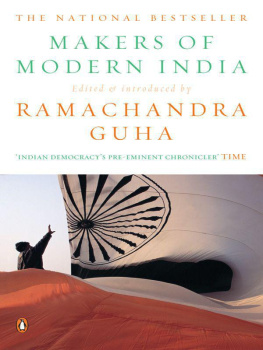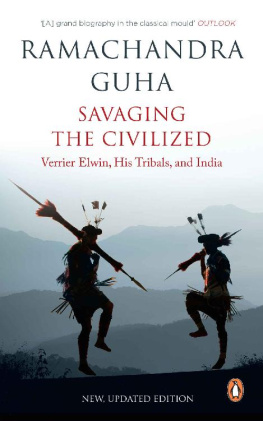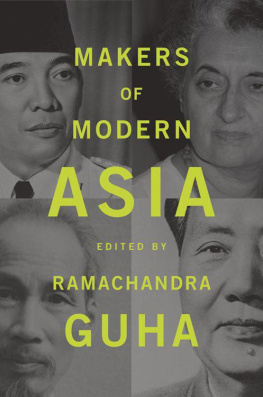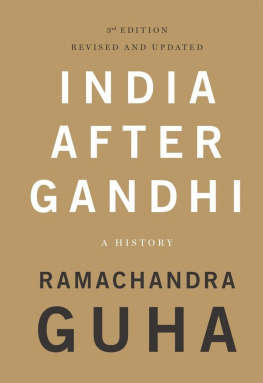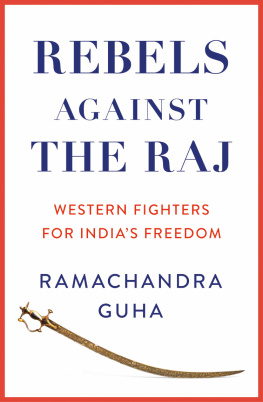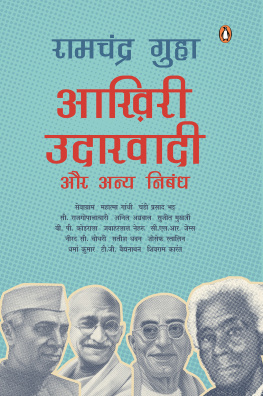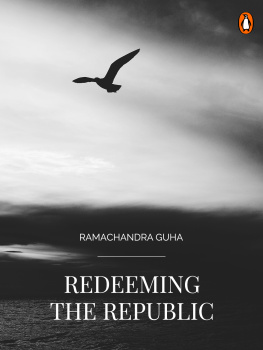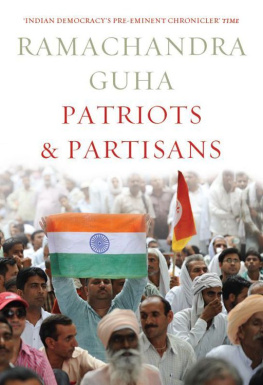
Edited and Introduced by
Ramachandra Guha
MAKERS OF
MODERN INDIA

Contents

To the selfless tribe of librarians and archivistsand in particular to
Dr N. Balakrishnan of the Nehru Memorial Museum and Library
PENGUIN BOOKS
MAKERS OF MODERN INDIA
Ramachandra Guha is a historian and columnist based in Bangalore. He has taught at the London School of Economics, Yale, Stanford and the Indian Institute of Science. His new book, Patriots and Partisans , a collection of essays published by Penguin in 2012, will be followed by new, updated editions of his earlier books Environmentalism: A Global History ; Savaging the Civilized: Verrier Elwin , His Tribals, and India ; and A Corner of a Foreign Field: The Indian History of a British Sport .
He is also the author of the internationally acclaimed India After Gandhi , chosen as a book of the year by The Economist , the Washington Post , the Wall Street Journal and Outlook ; and as a book of the decade by the Times of India and Hindustan Times . He is currently working on a biography of Gandhi, to be published by Penguin in 2013.
In 2008, Prospect and Foreign Policy magazines nominated Guha as one of the worlds hundred most influential intellectuals. He was awarded the Padma Bhushan in 2009.
Also By Ramachandra Guha
The Unquiet Woods:
Ecological Change and Peasant Resistance in the Himalaya
Savaging the Civilized:
Verrier Elwin, His Tribals, and India
Environmentalism:
A Global History
The Use and Abuse of Nature (with Madhav Gadgil) An Anthropologist among the Marxists and Other Essays
The Last Liberal and Other Essays
A Corner of a Foreign Field: The Indian History of a British Sport
India After Gandhi:
The History of the Worlds Largest Democracy
Patriots and Partisans
Preface to the Paperback Edition

This book presents the work and the words of the men and women who argued the Republic of India into existence.
I had first thought I would write a history of political thought in India, a single-authored work where mine would be the structuring hand and synthesizing voice. I soon realized that this would do injustice to the quality of the thought of Rammohan Roy, Jotiba Phule, Mohandas Gandhi, B.R. Ambedkar, Jawaharlal Nehru, Kamaladevi Chattopadhyay, et al. And so this became an anthology where Indian thinker-activists who fought social inequality, who promoted religious pluralism and freedom of expression, and who outlined a forward-looking path for the nation, spoke directly and extensively in their own voice, their words placed alongside the words of other thinker-activists who had powerfully resisted these trends.
Makers of Modern India thus provides a representative selection of the writings of this countrys most remarkable social reformers and political activists. In the prologue that follows, I explain the principles of inclusion and exclusion. These makers had all to be active in public life, and they had also to have written original works of social or political criticism. The former criteria excluded pure intellectuals, those who wrote and spoke but did not, in a meaningful social sense, act; the latter criteria excluded pure activists, those who reshaped society but did not leave behind an impressive enough body of writings and speeches.
While making my choices, I knew they would not be uncontroversial. As I write in the prologue: About the reception of this book I am certain only about one thing; that each region and language will have its own special grouse about people I have left out. An early reader of Makers of Modern India , who had just returned from a bout of public service in Bengal, joked that the next time I visited Kolkata I would need to protect myself with a crash helmet. He had in mind the exclusion from this book of such famous Bengalis as Swami Vivekananda, Sri Aurobindo and Subhas Chandra Bose. I had explained these (and other) omissions in my introduction, but my friend felt that the Bengalis would not be satisfied.
In fact, before I got to Kolkata I heard other parochial complaints. I had included as many as six Maharashtrians, but when I spoke about this book in Pun my hosts complained that I should have had at least two more (Savarkar and Agarkar were the names offered). In Chennai, my reading of excerpts from the writings of E.V. Ramaswami and C. Rajagopalachari prompted the questionwhy had I left out Kamaraj and Annadurai? A left-wing friend in Delhi University was enraged that I had not included any Marxist, and had compounded the sin by enshrining the right-wing reactionary M.S. Golwalkar as a maker of modern India. Arya Samajis charged me with dishonouring the memory of Dayananda Saraswati. A venerable old civil servant who had previously praised my books in print said he was withdrawing the praise because I had omitted Vallabhbhai Patel. Muslim intellectuals angrily asked why I had not included Maulana Azad; this sin compounded, in their view, by my featuring an (to them) obscure Maharashtrian named Hamid Dalwai.
I read and heard these criticisms, and remained unrepentant. As Hindu social reformers, Dayananda, Vivekananda and Aurobindo had all been superseded by Gandhi. Bose and Patel were men of action who were not profound thinkers. Likewise Kamaraj and Annadurai. There had been no genuinely original Marxist thinker-politician in India (if Bhagat Singh had lived another ten or twenty years he might have become the first). To have Savarkar and Agarkar when Golwalkar and Gokhale were already represented seemed superfluous. Azads views on HinduMuslim harmony were more eloquently conveyed in my book by Gandhi and Nehru. Urdu-speaking intellectuals in north India treated Hamid Dalwai with condescension because he wrote in that plebeian tongue, Marathi. But that was their problem, not mine. I had included Dalwai because he was a brilliant and brave thinker, a Muslim radical who spoke directly to the post 9/11 world.
I would yield no ground on these names, but still, the criticisms got me thinking. Were I to do this book again, whom else might I include? I think the one person I would add to the nineteen individuals profiled in Makers of Modern India is the engineer-administrator Mokshagundam Visvesvaraya. Builder of dams and steel mills, diwan of Mysore, he was emphatically a man of action; and he also wrote many books and pamphlets outlining his vision for a free India. This rested critically on the application of science and technology to augment living standards. As a technological modernizer, Visvesvaraya inaugurated a line of thinking whose later exemplars include such influential figures as Meghnad Saha, P.C. Mahalanobis, Homi Bhabha and Sam Pitroda, who have likewise believed that a scientific world view alone would make India strong, modern and developed.
Fortunately, a younger historian is planning a separate anthology on the scientists and technologists who helped make modern India. Meanwhile, two Mumbai writers are working on a book on the much underrated Hamid Dalwai. I have been enormously gratified by the popular reception of Makers of Modern India (it was reprinted several times in hardback, and several Indian language editions are under way). However, that this book shall provoke the publication of other books is perhaps more gratifying still.
Prologue
Thinking Through India

I
Next page
